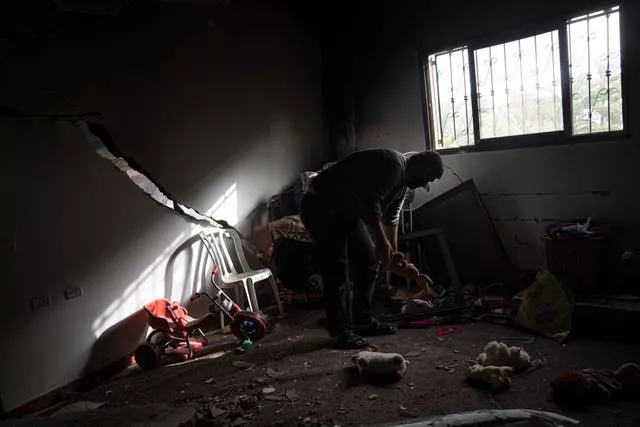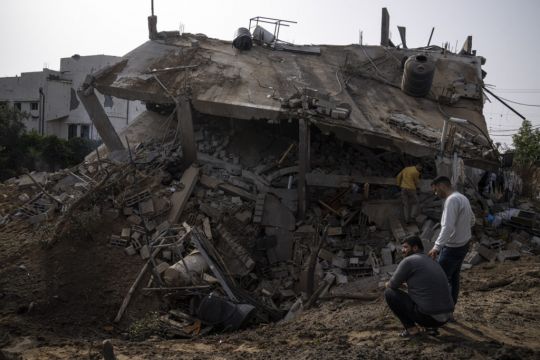The most violent confrontation in months between Israel and Palestinian militants has continued for a third straight day, as Israeli war planes struck targets in the Gaza Strip and militants fired rockets towards Jerusalem and southern Israel.
There were no immediate reports of casualties on either side on Friday, as foreign mediators pressed ahead with efforts to reach a ceasefire.
The past few days of fighting have killed 31 Palestinians in Gaza and a 70-year-old man in central Israel.

A burst of rocket fire from the Gaza Strip sent warning sirens wailing near the contested capital of Jerusalem, breaking a 12-hour lull that had raised hopes that Egypt, Qatar and the United Nations could soon be able to broker a ceasefire.
Residents in Israeli settlements surrounding Jerusalem reported hearing explosions and seeing black smoke rising from the hills after an apparent missile interception.
A rocket slammed into an open field in the south Jerusalem settlement of Bat Ayin, said Josh Hasten, a spokesperson for the area.
Videos showed Israelis jumping out of their cars and crouching as the sirens sounded.
An umbrella group of Gaza-based Palestinian factions known as the “joint operations room” said that they’d launched rockets “in response to the assassinations and continued aggression toward the Palestinian people”.

The office of Prime Minister Benjamin Netanyahu said he was conducting a security assessment.
The Israeli military said its war planes were striking Islamic Jihad targets in response to the rockets.
The cross-border exchanges this week have pitted Israel against Islamic Jihad, the second-largest militant group in Gaza after the territory’s Hamas rulers.
Since Tuesday, Israel says its strikes have killed five senior Islamic Jihad figures.
Islamic Jihad has retaliated with over 800 rockets fire toward densely populated parts of Israel. In that time, Israel’s military said it has used air strikes to hit at least 215 targets in Gaza, including rocket and mortar launch sites and militants preparing to use them.
Israeli bombs and shells have destroyed 47 housing units, and damaged 19 so badly they were uninhabitable, leaving 165 Palestinians homeless, Gaza’s housing ministry reported. In addition, nearly 300 homes sustained some damage.

At least 31 Palestinians in the Gaza Strip have been killed in the fighting, including seven children and four women, according to the UN humanitarian office.
At least three of the children were killed by misfired Palestinian rockets, according to the Israeli military and the Palestinian Centre for Rights. More than 90 Palestinians have been wounded, the Palestinian health ministry reported.
The civilians deaths have drawn condemnation from the Arab world and concern from the United States and Europe.
In its past four wars against Hamas, Israel has repeatedly faced accusations of war crimes due to the high civilian death tolls and its use of heavy weapons against the crowded enclave.
Israel, in turn, contends that Palestinian militant groups use civilians as human shields by fighting in their midst.

Hamas, the de facto civilian government with an army of some 30,000 in Gaza, has sought to maintain its truce with Israel while attempting to keep abysmal living conditions in the blockaded enclave from spiralling since a devastating 11-day war in 2021 that killed more than 260 Palestinians.
The group, which seized control of Gaza in 2007, has sat out this round of fighting – as it did a similar burst of violence last summer. In a sign of restraint, Israel has limited its air strikes to Islamic Jihad targets.
Both sides had seemed on the brink of a ceasefire before the eruption of Thursday’s violence. Friday’s relative calm boosted hopes of progress.
Hamas officials told local media that Egypt was ramping up its diplomatic efforts to stop the fighting through “intensive contacts” with both Hamas and Islamic Jihad.
Islamic Jihad figures have sent mixed signals about the ceasefire talks. Senior official Ihsan Attaya complained on Friday that the mediators “have been unable to provide us with any guarantees”.
A sticking point has been Islamic Jihad’s demands that Israel cease its policy of targeted killings, Mr Attaya said.
Islamic Jihad political bureau member Mohamad al-Hindi sounded more optimistic. From Cairo, where he travelled on Thursday to hash out the details of a possible truce, he told media that he hoped both sides “would reach a ceasefire agreement and honour it today”.







